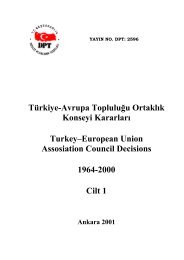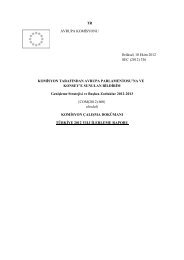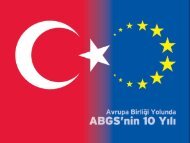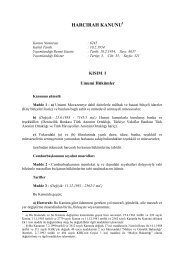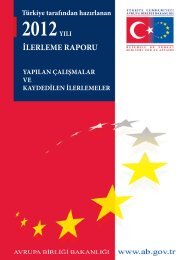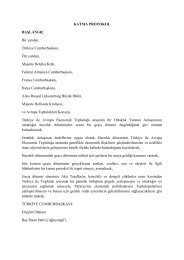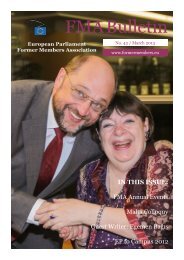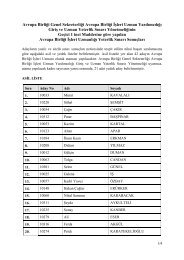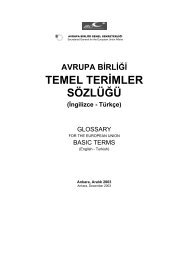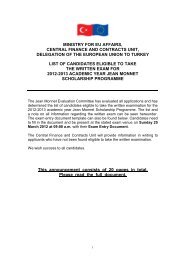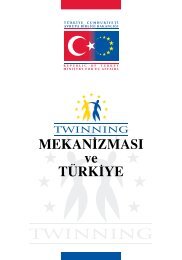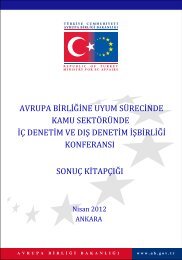2010 ilerleme raporu - Avrupa BirliÄi BakanlıÄı
2010 ilerleme raporu - Avrupa BirliÄi BakanlıÄı
2010 ilerleme raporu - Avrupa BirliÄi BakanlıÄı
You also want an ePaper? Increase the reach of your titles
YUMPU automatically turns print PDFs into web optimized ePapers that Google loves.
Overall, the implementation of the prison reform programme continues. However, the high<br />
proportion of prisoners in pre-trial detention remains one of the most significant problems.<br />
Health services in prisons need to be improved.<br />
As regards freedom of expression, an increasingly open and free debate continued on a wide<br />
scale in the media and public on topics perceived as sensitive, such as the Kurdish issue,<br />
minority rights, the Armenian issue and the role of the military.<br />
There are few cases initiated on the basis of Article 301 of the Turkish Criminal Code (TCC),<br />
after it was amended in May 2008 15 .<br />
However, a high number of violations of freedom of expression by Turkey are still being<br />
submitted to the ECtHR.<br />
Defamation is a criminal offence under Turkish law. Article 125 of the TCC provides that<br />
defamation is punishable by either a prison sentence or a fine. There are many ongoing cases<br />
and convictions under this provision. Insults against the Turkish nation are still criminalised<br />
under Article 301 of the TCC. Other provisions of the TCC 16 , the Anti-Terror Law and the<br />
Press Law are also used to restrict freedom of expression.<br />
The high number of cases initiated against journalists who have reported on the Ergenekon<br />
case is a cause for concern 17 . They face prosecutions and trials for violating the principle of<br />
confidentiality of an ongoing judicial process. This could result in self-censorship.<br />
Pressure on newspapers discussing the Kurdish question or publishing in Kurdish increased.<br />
In the course of the year, publication of the Azadiya Welat newspaper in Diyarbakır was<br />
banned several times and its journalists were sentenced in prison under terrorism propaganda<br />
charges. In its ruling on the Ürper and others v. Turkey case, the ECtHR ruled that Turkey<br />
should revise Article 6(5) of the Anti-Terror Law.<br />
The review carried out by the Ministry of Justice on the legal framework on freedom of<br />
expression was not finalised.<br />
Regarding hate speech, the Council of Europe 18 recommended Turkey to encourage the media<br />
to develop a code of ethics on respect for religious minorities and to prosecute incitement to<br />
hatred passed on by the media.<br />
15<br />
16<br />
17<br />
18<br />
According to the Ministry of Justice, since the amendment to Article 301 of the Turkish Penal Code, a<br />
decrease in the number of cases opened has been observed. The figures below cover examinations<br />
concluded between 1 January <strong>2010</strong> and 31 July <strong>2010</strong>: 369 files examined, 270 files for which<br />
permission was denied, 10 files for which permission was granted, 3.57% files for which permission<br />
was granted<br />
Examples include offences against public order (Articles 214, 216, 217, 218 and 220 of the TCC), State<br />
security (Article 305) or the constitutional order (Articles 312 and 314) and obscenity (Article 226). In<br />
addition, prosecutions and convictions are continuing on the basis of Article 318 of the TCC (on<br />
discouraging people from military service).<br />
4,091 investigations have been initiated against journalists for breaches of the confidentiality of<br />
investigations or attempts to influence a fair trial (Articles 285 and 288 of the Turkish Criminal Code),<br />
following their reporting on the Ergenekon case.<br />
CoE Resolution 1704 (<strong>2010</strong>).<br />
EN 20 EN




